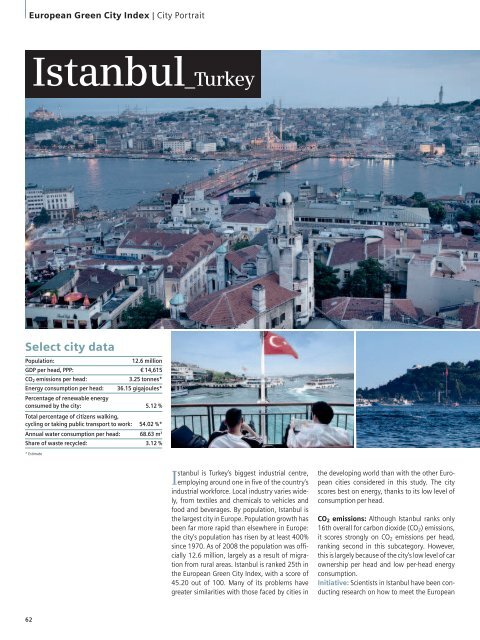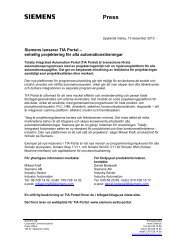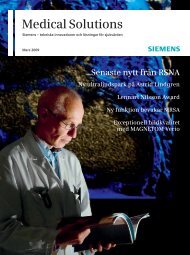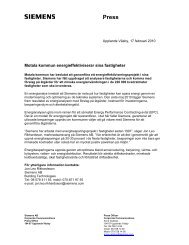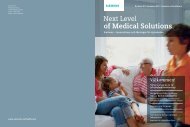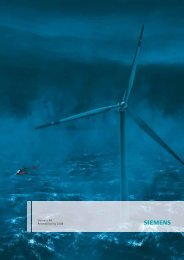European Green City Index - Siemens
European Green City Index - Siemens
European Green City Index - Siemens
Create successful ePaper yourself
Turn your PDF publications into a flip-book with our unique Google optimized e-Paper software.
<strong>European</strong> <strong>Green</strong> <strong>City</strong> <strong>Index</strong> | <strong>City</strong> Portrait<br />
Istanbul_Turkey<br />
Select city data<br />
Population: 12.6 million<br />
GDP per head, PPP: € 14,615<br />
CO2 emissions per head: 3.25 tonnes*<br />
Energy consumption per head:<br />
Percentage of renewable energy<br />
36.15 gigajoules*<br />
consumed by the city: 5.12 %<br />
Total percentage of citizens walking,<br />
cycling or taking public transport to work: 54.02 %*<br />
Annual water consumption per head: 68.63 m3 Share of waste recycled: 3.12 %<br />
* Estimate<br />
Istanbul is Turkey’s biggest industrial centre,<br />
employing around one in five of the country’s<br />
industrial workforce. Local industry varies widely,<br />
from textiles and chemicals to vehicles and<br />
food and beverages. By population, Istanbul is<br />
the largest city in Europe. Population growth has<br />
been far more rapid than elsewhere in Europe:<br />
the city’s population has risen by at least 400%<br />
since 1970. As of 2008 the population was officially<br />
12.6 million, largely as a result of migration<br />
from rural areas. Istanbul is ranked 25th in<br />
the <strong>European</strong> <strong>Green</strong> <strong>City</strong> <strong>Index</strong>, with a score of<br />
45.20 out of 100. Many of its problems have<br />
greater similarities with those faced by cities in<br />
the developing world than with the other <strong>European</strong><br />
cities considered in this study. The city<br />
scores best on energy, thanks to its low level of<br />
consumption per head.<br />
CO2 emissions: Although Istanbul ranks only<br />
16th overall for carbon dioxide (CO2) emissions,<br />
it scores strongly on CO2 emissions per head,<br />
ranking second in this subcategory. However,<br />
this is largely because of the city’s low level of car<br />
ownership per head and low per-head energy<br />
consumption.<br />
Initiative: Scientists in Istanbul have been conducting<br />
research on how to meet the <strong>European</strong><br />
Commission’s proposal to limit CO2 emissions by<br />
passenger cars to 120 grams per kilometre by<br />
the end of 2012. They have produced new<br />
engine models that can reduce CO2 emissions by<br />
up to 19%.<br />
Energy: Istanbul performs well in the energy<br />
category, ranking 11th overall and first in the<br />
energy consumption subcategory. Istanbul’s<br />
energy consumption per head is estimated at 36<br />
gigajoules, less than one-half of the 30 city average<br />
of 81 gigajoules.<br />
Initiative: A new renewable-energy bill is expected<br />
to be passed later in 2009, offering generous<br />
electricity contract guarantees for new hydro,<br />
wind, geothermal and solar power projects.<br />
Buildings: Istanbul ranks poorly, in 28th place,<br />
in the buildings category. The majority of Istanbul’s<br />
buildings date from the 1960s onwards<br />
and have been poorly constructed, with little<br />
thought given to energy efficiency. Some new<br />
buildings are being constructed with attempts at<br />
energy efficiency, but there are no universal<br />
standards in place.<br />
Initiative: Discussions have begun about the<br />
possibility of issuing buildings with “energy<br />
deeds” that would identify the efficiency of their<br />
energy use.<br />
Transport: Istanbul ranks poorly, at 23rd, in the<br />
transport category, because of the explosive<br />
growth of private car ownership in the city since<br />
the 1980s and the failure of authorities to make<br />
sufficient investment in public transport to meet<br />
the population’s growing needs.<br />
Congestion remains the most pressing problem,<br />
and all transport initiatives aim to address<br />
this.<br />
Initiative: Work is continuing on expanding the<br />
city’s metro and tram lines, with ongoing construction<br />
of 50 km of new line to be completed<br />
by 2012; construction of a further 64 km awaiting<br />
tender; plans being finalised for another 30<br />
km; and the possible development of plans for a<br />
further 293 km under discussion.<br />
Water: Although Istanbul ranks only 23rd for<br />
water, it performs well with regard to water consumption<br />
per head, coming seventh overall in<br />
this subcategory and first among cities with<br />
high average temperatures.<br />
Initiative: The city’s municipal water company,<br />
ISKI, plans the construction of seven new biological<br />
treatment plants capable of processing<br />
70,000 cubic metres per day, to supply a storage<br />
facility holding treated water for use in industry<br />
and horticulture.<br />
Waste and land use: Istanbul ranks 25th in the<br />
waste and land use category, largely because of<br />
the small amount of green space in the city — at<br />
only 6.4 square metres per person — and its<br />
poor record on recycling and waste management.<br />
Most recycling is still conducted on an<br />
informal basis by impoverished communities living<br />
adjacent to landfill sites.<br />
Initiative: In its 2007 strategic plan, Istanbul’s<br />
municipality announced that it aimed to<br />
increase the percentage of packaging materials<br />
recycled from 15% in 2006 to 61% by 2011.<br />
Air quality: Istanbul ranks 23rd for air quality,<br />
which, given its size and the nature of its<br />
growth, can be regarded as a relatively good performance.<br />
High-grade imported coal and fuel oil<br />
are still used, which accounts for the city’s poor<br />
ranking on particulates.<br />
Initiative: In its 2007 strategic plan, the municipality<br />
stated its intention to increase the number<br />
of air quality monitoring stations from 10 to<br />
17 and to install public display systems indicating<br />
air quality.<br />
Environmental governance: Istanbul ranks<br />
29th for environmental governance. This is partly<br />
because regulations are routinely ignored.<br />
Public participation in environmental debates is<br />
not encouraged, and there has been little effort<br />
to educate people or raise awareness of environmental<br />
issues.<br />
Initiative: The municipality of Istanbul is implementing<br />
a new regulation plan in the period to<br />
2010 that aims to institute a “preservation and<br />
development” balance. The plan acknowledges<br />
the effect of metropolitan settlement on the<br />
environment.<br />
Environmental governance Energy<br />
6<br />
62 63<br />
Air Quality<br />
CO2<br />
10<br />
8<br />
4<br />
2<br />
0<br />
Buildings<br />
Waste and Land Use Transport<br />
Water<br />
Landfill<br />
methane power<br />
Istanbul<br />
Best<br />
Average<br />
Two of Istanbul’s landfill waste sites have been<br />
adapted to allow methane produced from<br />
buried waste to be used by commercial power<br />
plants. One site currently powers both a 7.5<br />
mw and a 7 mw plant, which is already in the<br />
process of being expanded to 14.3 mw. Two<br />
further plants with capacities of 4 mw and 1<br />
mw are under construction, and others are expected<br />
to be built in the future as new landfill<br />
sites are developed with power production as<br />
part of the design criteria. These sites generate<br />
methane-rich landfill gas as organic solid<br />
waste gradually breaks down. To prevent uncontrolled<br />
venting of the gas, it is extracted<br />
via a network of pipes, processed and fed into<br />
engines to generate an alternative supply of<br />
electricity. Altogether, these four sites will be<br />
able to produce enough energy to support the<br />
requirements of around 100,000 households<br />
in Istanbul. As a result, the sites have attracted<br />
attention as one of the largest waste-to-energy<br />
projects in the world.


